In early December, we were elated to return in person for our Zinn Education Project booth and workshops at the annual National Council for the Social Studies conference in Philadelphia.
Our team offered four popular workshops: Who Ended Slavery? How the Enslaved Resisted; Teaching the Black Freedom Struggle: A Discussion on Reconstruction Education in K–12 Schools; What We Don’t Learn About the Black Panther Party; and How Red Lines Built White Wealth: Housing Segregation in the 20th Century. In each session, attendees had the opportunity to experience portions of the lessons led by Ursula Wolfe-Rocca, Mimi Eisen, and Adam Sanchez.
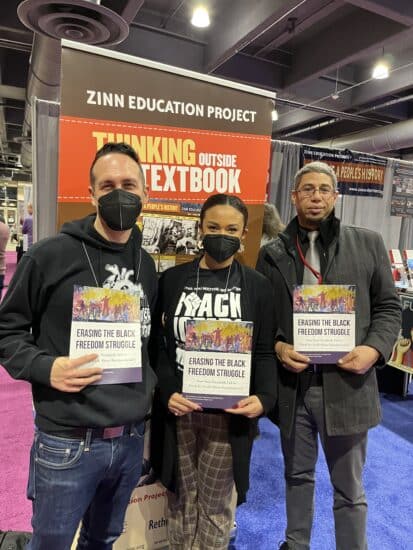
Adam Sanchez, Cierra Kaler-Jones, Ismael Jimenez at the Zinn Education Project booth at the NCSS 2022 Conference in Philadelphia.
At the Zinn Education Project exhibit hall booth, we introduced teachers to our Reconstruction report, Climate Justice campaign, the new documentary and lessons on Rosa Parks, Rethinking Schools books and magazine, Teaching for Black Lives study groups, the Howard Zinn Centennial, and more. The Colored Conventions Project joined us, sharing posters of their beautiful new mural.
The School District of Philadelphia social studies coordinator and Zinn Education Project colleague Ismael Jimenez (in photo to right) presented sessions with his team about how their entire curriculum has a social justice orientation and they are committed to teach outside the textbook. In the face of so many districts attempting to mandate textbook driven instruction, it was encouraging to meet in a city that is affirmatively going in the opposite direction.
Teach Truth
Educators took photos with our #TeachTruth frame.
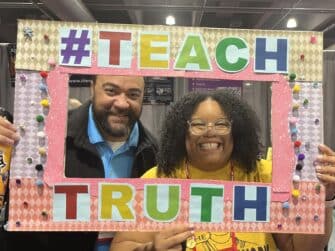 |
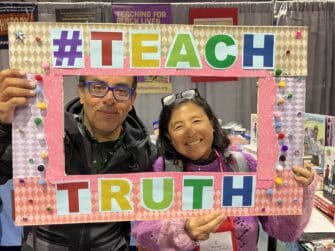 |
Teaching Stories
Many visitors shared stories about using Zinn Education Project lessons in their classrooms.
View this post on Instagram
View this post on Instagram
View this post on Instagram
View this post on Instagram
Several teacher educators stopped by to tell us how they have used our lessons with pre-service teachers, including Jenni Gallagher.

I always point my teacher candidates in the direction of the Zinn Education Project materials. They are honest, courageous, and necessary for powerful social studies learning.
In particular, I’m very grateful for the materials that explore labor history and environmental issues as high quality curriculum resources on these topics are hard to find.
Books for Stories
Thanks to donations from publishers, we raffled more than a dozen titles to teachers who participated in the booth activities, such as Share Your Story.
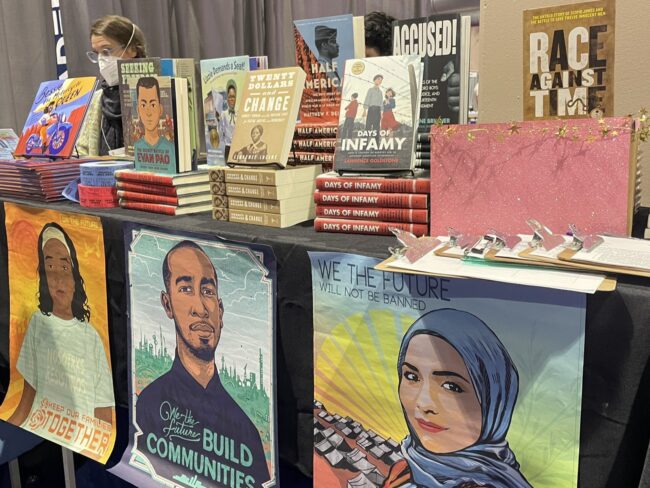
The selection included titles for all grade levels related to our campaigns and lessons.
- Rethinking Schools books Teacher Unions and Social Justice, A People’s Curriculum for the Earth, Teaching a People’s History of Abolition and the Civil War, Rethinking Columbus, Rethinking Globalization, and more.
- A People’s History of the United States by Howard Zinn
- The Rebellious Life of Mrs. Rosa Parks Young Readers Edition by Jeanne Theoharis with Brandy Colbert
- Black Was the Ink by Michelle Coles
- Twenty Dollars and Change by Clarence Lusane
- Days of Infamy by Lawrence Goldstone
- Half American:The Epic Story of African Americans Fighting World War II at Home and Abroad by Matthew Delmont
- Lizzie Demands a Seat by Beth Anderson
- Accused!: The Trials of the Scottsboro Boys: Lies, Prejudice, and the Fourteenth Amendment by Larry Dane Brimner
- Seeking Freedom: The Untold Story of Fortress Monroe and the Ending of Slavery in America by Selene Castrovilla
The publishers Astra House/Calkins Creek, Beacon Press, Lee & Low, HarperCollins Publishers, City Lights, Candlewick Press, Scholastic, and Viking made this giveaway possible.
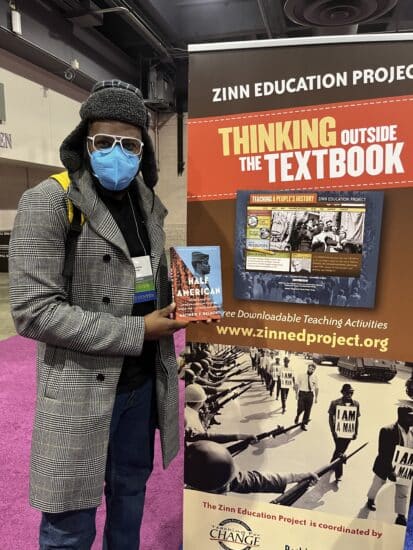 Corey Winchester with Matt Delmont’s book on African Americans during WWII. |
 Denisha Jones with The Rebellious Life of Mrs. Rosa Parks. |
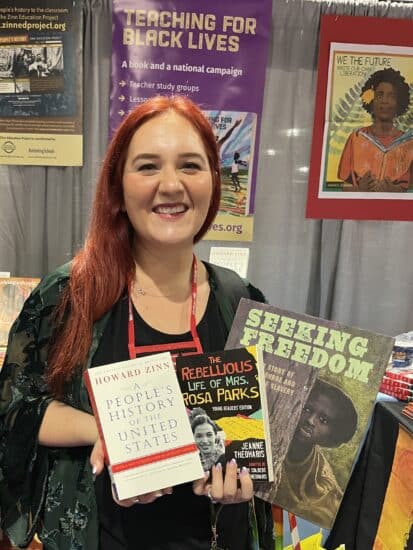 Brooke Bachy with A People’s History of the United States and more. |
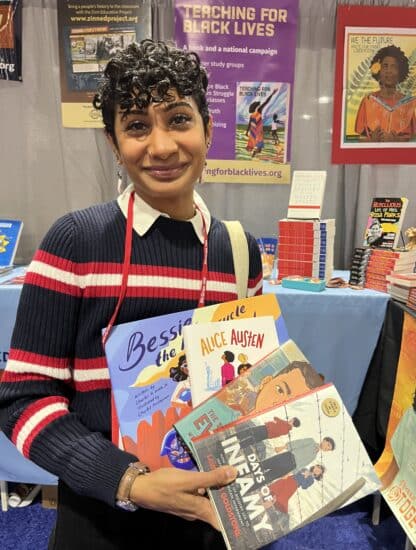 Divya Seshadri with Days of Infamy and more. |
Check out more photos in this Flickr album.

Howard Zinn Centennial
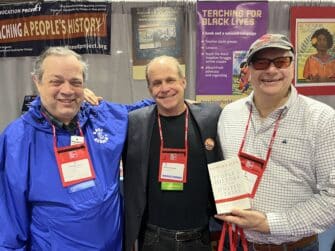 This year’s conference fell during the Howard Zinn Centennial. Teachers shared stories about reading A People’s History of the United States when they were in high school and how the book shapes their teaching today.
This year’s conference fell during the Howard Zinn Centennial. Teachers shared stories about reading A People’s History of the United States when they were in high school and how the book shapes their teaching today.
William Holtzman, Howard Zinn’s former student and Zinn Education Project co-founder, volunteers at the NCSS booth each year. He is pictured here (in the middle) with two teachers who noted that A People’s History of the United States was a core text for their district’s AP U.S. History classes until recently. They wondered if the rightwing attacks on teaching U.S. history (“anti-CRT”) led to the text being dropped.
More Exhibits and Speakers
We had a chance to meet with many of our colleagues who had exhibits, including Learning for Justice, Facing History, Seven Stories Press, Beacon Press, Haymarket Books, Teach Rock, Americans Who Tell the Truth, CLASP, Human Rights Educators, Mikva Challenge, and the Right Question Institute.
In addition to our own workshops, there were people’s history and social justice focused sessions by Tiffany Mitchell Patterson, Chris Seeger, Mark Kissling, Ismael Jimenez, Debbie Wei, Yianella Blanco, Camika Royal, Robert Shetterly, Denise Woltering, and more. There was a lot to learn from the featured speakers, including Gholdy Muhammad, Hasan Kwame Jeffries, Juan Gonzalez, Heather McGhee, Yohuru Williams, LaGarrett King, Anna Malaika Tubbs, and Matthew R. Kay.
Of course, there were also exhibits and presenters that reminded us of the challenges we face, such as the Ronald Reagan Presidential Foundation and Institute and the Koch funded Bill of Rights Institute.
Get Ready for Nashville
We look forward to the 2023 conference in Nashville. To prepare, we are reading I’ll Take You There, edited by Amie Thurber and Learotha Williams. The Nashville Scene notes that,
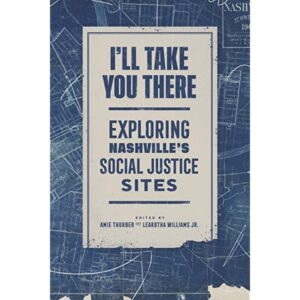
When selecting entries, there were three criteria [for I’ll Take You There]: “sites that challenge missing or misinformation; sites that reveal privilege or dominance; and sites that celebrate cultural resistance, resilience, and creativity.” The result is intricate and varied.
. . . Many entries critically examine the histories of well-known spots. In “Mansker Station,” Thurber muses that “for White colonists, Mansker Station represented a place of refuge and safety. For the Indigenous inhabitants of the area, it represented the deepening threat to their sovereignty and continued existence on the land they had called home for generations.” The “Aaittafama’ Archaeological Park” entry notes that Old Hickory Boulevard paved over sacred Indigenous burial grounds. The “Downtown” section features the story of Black Bottom, a “center of African-American education, culture, and business in Nashville.” Despite its significant impact on downtown Nashville, “revitalization” projects flattened Black Bottom.
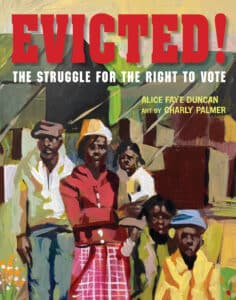 We also recommend the picture book, Evicted!: The Struggle for the Right to Vote by Alice Faye Duncan, about what happened to Black sharecroppers in Fayette County, Tennessee, when they tried to exercise their right to register to vote in the late 1950s.
We also recommend the picture book, Evicted!: The Struggle for the Right to Vote by Alice Faye Duncan, about what happened to Black sharecroppers in Fayette County, Tennessee, when they tried to exercise their right to register to vote in the late 1950s.
We encourage people’s history teachers to submit a proposal to present at the 2023 NCSS conference. The application will open soon. We’ll post it here when it does.

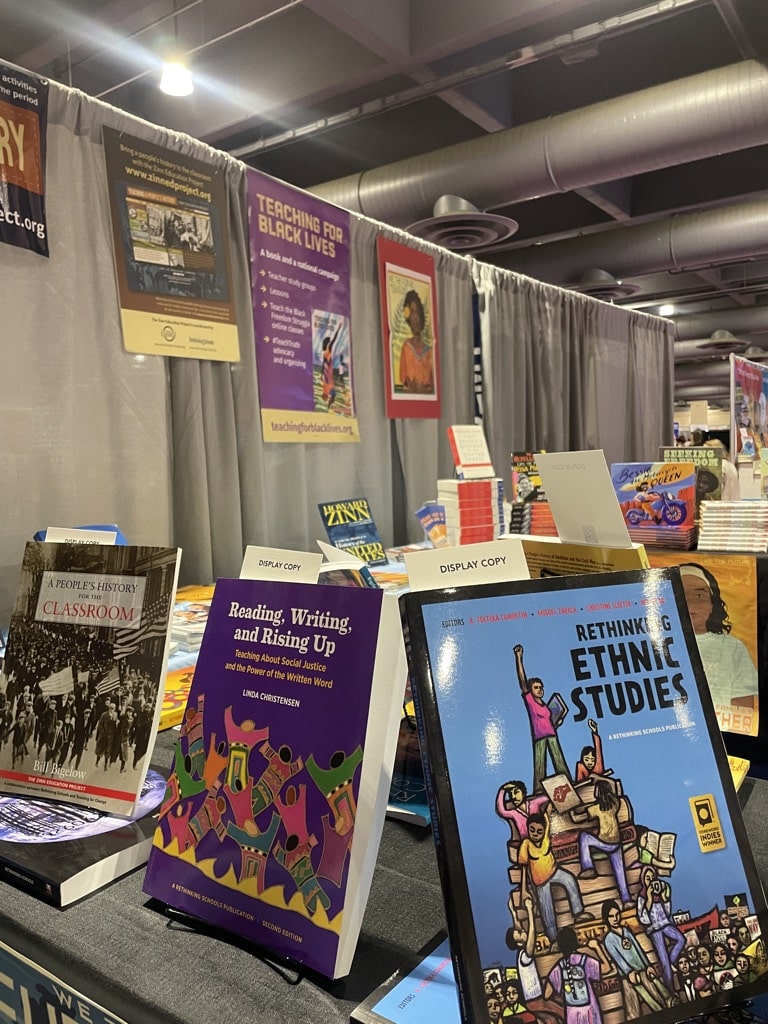





Twitter
Google plus
LinkedIn